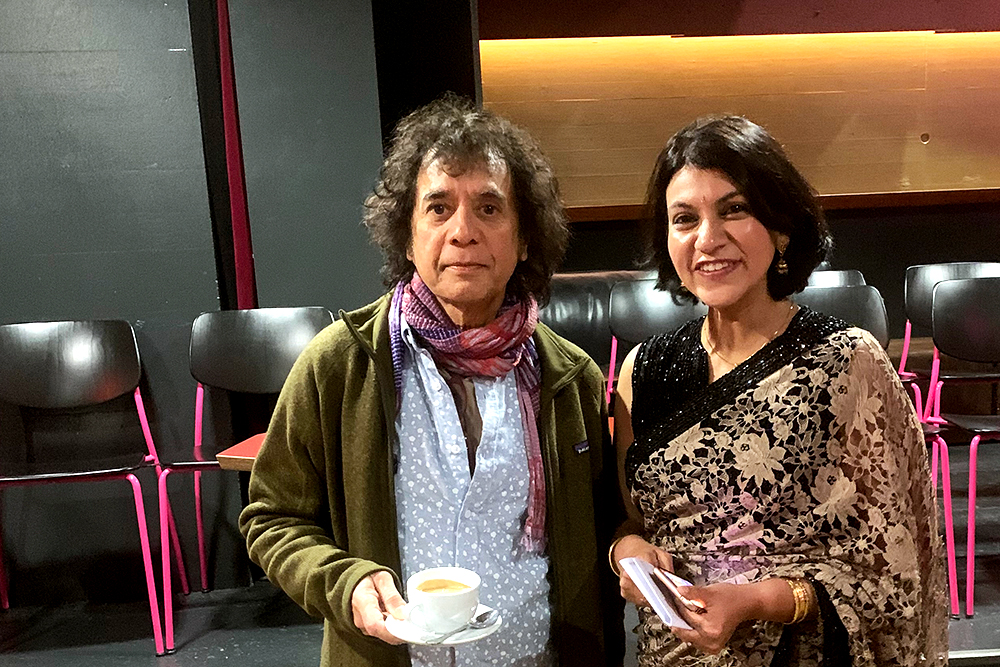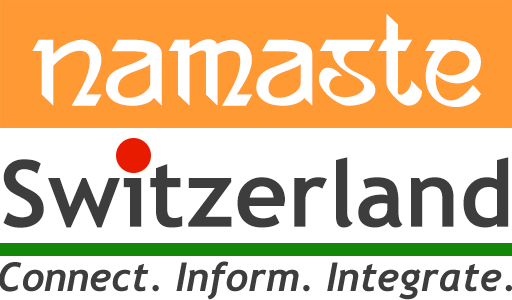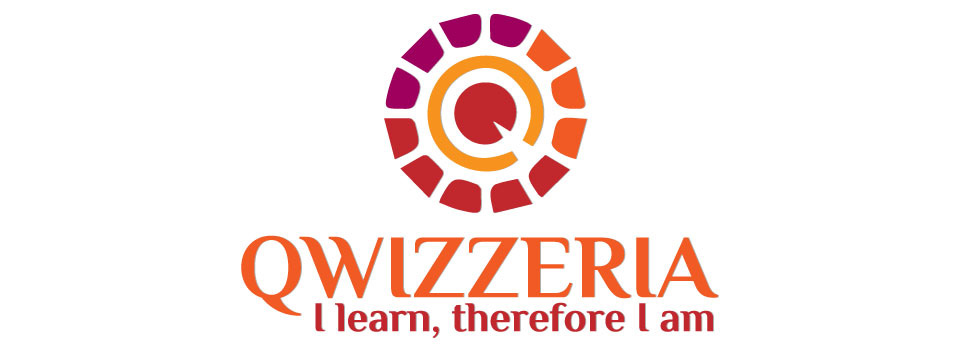Zakir Hussain: the legend needs no introduction… mic drop.
At 68, he looks younger than his years. His eyes shine bright, his smile is warm, his ‘namaste’ is dignified and down-to-earth, his handshake is confident, and his energy is palpable even after his long flight from the US to Switzerland. A catnap and a light meal of soup is enough for him to recharge and get set to give another one of his magnificent performances.
Twenty years ago, Zakir Hussain, the legendry ‘tabla’ maestro was a youthful judge at the Femina Miss India contest. That’s when I – a young, fresh-out-of-college journalist – first met him. He had a heady charismatic and flamboyant presence. Twenty years hence, I met him again – and nothing seemed to have changed.
The Indian ‘tabla’ virtuoso, composer, percussionist, music producer, film actor and eldest son of legendary ‘tabla’ player Ustad Allah Rakha, sits at the table, spooning his soup, minutes before his performance and answers each of my questions in his uniquely charming manner, which puts me at ease, as I set off on a musical journey with a legend of the times at Moods, Schiffbauplatz, Zurich.

His affair with Switzerland
It all began in 1970 – and since then, he has been visiting almost every year. “Switzerland is such a small yet diverse country. With German, French and Italian – I am fascinated with the place, the people and the different food. Truth be said, I am a Kashmiri at heart with a fascination for mountains and fresh clean air. Over the years, I’ve spent days together in Zurich. Yes, I spent a lot of time here. About eight years ago, I visited very often, simply because my good friend Tina Turner lives here close to the lake. I was spending a lot of time here as I was writing music for her. I often go up into the mountains and spend days out there – the clean air, the cowbells… I stay there until I had enough of the beautiful nature. Through my trips here, I’ve visited Basel, Geneva and Lausanne, where I have friends. In fact, there’s a school at Basel, where I used to deliver guest lectures at one point. I visited Freiburg a lot too. Still, Niederrickenbach is a favourite,” he reminisces.
Then there is the Montreux Jazz Festival: “My first performance there was in 1975. Since then, I have performed at the Jazz festival about 12 times. What’s really remarkable and endearing about the Montreux Jazz Festival is seeing art and culture being celebrated here in such a huge way. The town administration gets involved, people make you feel so welcome and they make it so personal. That huge area is closed off to traffic; people can walk in and enjoy the music… It’s quite an amazing experience – and a very different one.

Thoughts on the evolution of music
Ustad Zakir Hussain has been performing since he was 12 (1963). Over decades, he has seen the evolution of music and has greatly influenced it as well. Just a while ago, he was tuning his set of five ‘tablas’ using a smart phone app. What are his views on this change?
Nonchalantly, he says, “Music is moving towards having a universal approach and focus. For instance, today’s concert, where I am playing with Dave Holland and Chris Potter – it is a whole new concept. Twenty years ago, things were different. If you were a musician, there were a lot of questions about what are you playing and how, what that type of music does mean, and so forth… And then, you would play an hour-long concert and leave. Today, there is a comfortable level of familiarity with each other’s cultures already. The conversations are much deeper. The relationship between artists – not just musicians, but also painters, sculptors, dancers, etc. – starts already at an advanced level because there is a global renaissance taking place, where the people from different countries are interested and are busy ‘googling’ for information. Young people are watching ‘chutney’ music, Buddha bar music and so much more, and they are constantly discovering more. That’s great! And it’s very interesting.”
“The best part – and I thank God for that – is that tradition is not being allowed to disappear. This interaction does not dilute tradition. In fact, today, tradition is being acknowledged, respected and applauded even more. There’s a healthy respect of cultures all over the world. For instance, recently, some Japanese musicians approached me. They already knew about me, my teachers, what I had learned, what I do and what I represent. And similarly, I found out more about them. Information is openly available online. So, there is already a familiarity at many levels allowing us to respect and understand each other’s roots.
For instance, when Dave Holland is playing Jazz, I am aware of what he is playing and can join him in concert to explore Jazz. And that makes him feel that I am paying respect to his country. Our interaction moves at a whole different level. That’s what is happening today –an advancement of finding a universal voice of music that represents vocabulary from each part of the world, with a multilingual grammar, and at the same time an understanding that we cannot move forward to create a universal voice – culturally and artistically – without the awareness of preserving and nurturing the roots of each individual musical language.”

Crosscurrents and Good Hope
This leads me to question him on the formation of Crosscurrents – an international super-group that represents a long and vibrant relationship between Jazz and Indian classical music.
The group comprises: Jazz Master bassist Dave Holland, who has led numerous Grammy Award-winning bands and anchored groundbreaking groups led by Miles Davis, Chick Corea, Joe Henderson, and Jack DeJohnette. Chris Potter, the most compelling saxophonist of his generation. Zakir Hussain, who mastered the 3,000-year-old ‘tabla’ percussion tradition and has formed significant cross-cultural projects and worked with George Harrison, the Grateful Dead, Shakti (with John McLaughlin), Béla Fleck, Pharoah Sanders, and Sangam (with Charles Lloyd). And four of India’s most progressive musicians: guitarist Sanjay Divecha, pianist Louiz Banks, drummer Gino Banks, and the globally celebrated vocalist Shankar Mahadevan.
Crosscurrents Trio essentially comprises the first three. And together they have released a new album called Good Hope. So how did this group come together and why?
“I am to blame,” smiles the Ustad. “We all know Sitar maestro, Pandit Ravi Shanker, and my father Ustad Allah Rakha travelled the world and brought Indian music out to the larger audiences. Back then, people came to India to learn music, yoga and follow a spiritual journey. But somehow musicians did not gain recognition – their contributions went missing. In the 1930s and 40s, Hollywood musicals inspired Indian musicals and movies – and many musicians picked up western instruments like the violin, and cello to play Jazz and western classical music. That became the spine of Bollywood. But still the inspiration was not acknowledged. I wanted to bring those musicians from India, who have nurtured, preserved and spread western classical music and Jazz without receiving an acknowledgement, and put them together with western musicians. I wanted them to be invited here to the West and so Crosscurrents was formed. The American tour as a big success and a demand was created. We also started playing as a duo and trio – and with the growing demand for our concerts, we made Crosscurrent Trio with Dave Holland, Chris Potter and myself.”
His most cherished moment
Over decades, Zakir Hussain has performed with the great maestros and legends of all ages and stages. Which one of these has become his most cherished memory?
“It’s difficult to pinpoint one as I play so many styles of music. It’s like saying Roger Federer is an overall good tennis player – and then there are others who are good on grass courts, or on clay, on hard or on carpet. Whether music or sports, when you play with different people, you have different experiences. Each experience has a different high and a different moment. Each has a moment of special enlightenment that makes it unique. Jazz, world music, or Indian music; instrumental, solo, or dance – there are multiple interactions with moments of incredible revelations and a peep into a spiritual spot or space that’s been a cause of supreme elation.
I can’t say one is better than the other… each is unique conversation in a different language and on a different journey. I’ve been lucky enough to see ‘niravana’ of some sort in the different encounters and I find it a good space to be in.”

So what is ‘nirvana’ really?
“Buddha defined ‘nirvana’ in the form of renunciation – no good, no bad, no ‘maya’, no attachment. I say that my ‘nirvana’ is in the understanding that I am mere drop in the ocean. I am not a master, but a student. I am learning and experiencing a revelation that there are miles to go before I sleep… and then, coming to terms with that and not struggling with ‘having to know it all now and today’. Realizing and accepting that when I die, there will be a lot more to explore, but I won’t find it – and not feeling threatened in knowing that I am not the best in the world… Learning to accept that as just a piece of factual information that does not worry me. That, to me, is my ‘nirvana’.”
Awards – in the eyes of the maestro
Listing his achievements and awards would mean dedicating an entire site to him, but for those who want to know it all – check out his profile at: https://en.wikipedia.org/wiki/Zakir_Hussain_(musician)
“The Padmas, Grammys, everything is great; awards come to you as a pat on the back. They aren’t a sign of an achieved pinnacle, but just an indication your peers have recognised your thirst of knowledge and acknowledge that you have found your path. Awards are the beginning of the next phase,” he says.
With so many awards and honours over the years, is there one that makes the legend really sit up and say, “Wow! I did it!”
A nostalgic smile plays on his lips and serenely, he says, “Yes, there is. There is always one nod from the guru, the one who is your guiding light, the one who shows you the path. That nod from the guru is the best award you can ever get. A student always looks at the guru to see if he is satisfied and proud. A student always thinks: is that what he wanted me to do? Have I done it? Have I made him proud? And, when you get that nod, you know you’ve done it. And that happened – once! At 3:00am in the middle of a concert in Mumbai, Pandit Ravi Shankarji announced that Zakir had received the Padma Shree. My dad was sitting in the audience in the front seat. His face lit up and he ran up to the stage, picked up a garland lying somewhere there, and garlanded me. That was it! What more could I have asked for – my father, who’s been my guru… and when you have that hand on your head…” He stops talking and turns his mobile to reveal a black and white picture of that moment – the moment with the hand of his father and guru on his head. The glint of elation in his eyes beams again as if this was just yesterday.
With that, we conclude the interview between Namaste Switzerland and Ustad Zakir Hussain, who was in Zurich for a Crosscurrents Trio event organized by Nihar Mehta – the founder President of the Association Saptak-India. Nihar himself a re-known tabla player and hails from one of the most respected families of philosophers and musicians in Ahmedabad. He started learning the ‘tabla’ when he was 12 – and since then, he has performed in prestigious venues and festivals in Europe. For more information, please visit: https://www.linkedin.com/in/nihar-mehta-44ba9079/?originalSubdomain=fr
Disclaimer: Written in good faith, we do not undertake any financial/reputational impact or other obligations/liabilities that may arise from the content.













Trackbacks/Pingbacks